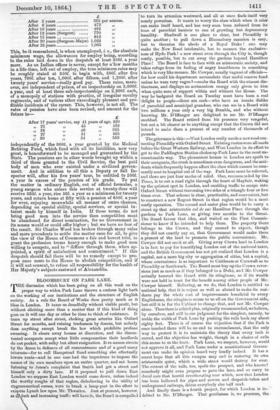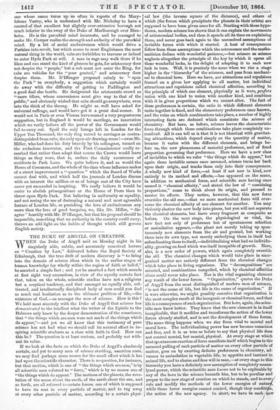BLOOMSBURY ON PARK LANE.
THE discussion which has been going on all this week on the proper way to widen Park Lane throws a curious - light both on the working of our institutions and the structure of English society. As a rule the Board of Works does pretty much as it likes in London. It taxes us dreadfully without visible profit, but without eliciting more than a mutter that if this kind of thing goes on it will one day or other be time to think of resistance. It tears up street after street, choking great arteries like Oxford Street for months, and ruining tradesmen by dozens, but nobody does anything except break the law which prohibits profane swearing. It clears away houses at discretion, and the discon- tented occupants accept what little compensation their landlords do not pocket, with sulky but silent resignation. It re-names streets by the dozen in defiance of all remonstrance and of a good many interests—for to call Hampstead Road something else effectually lowers rents—and in one ease had the impudence to impose the names of its own members upon an entire quarter, and sat hours listening to Jones's complaint that Smith had got a street and himself only a dirty lane. If it proposed to pull down East London we suppose East London would come down, unless indeed the worthy roughs of that region, disbelieving in the utility of Ungrammatical curses, were to break a lamp-post in the effort to ex ute Lynch law upon Mr. Thwaites. Just at present, however, luck and increasing train; will have it, the Board is compelled
to turn its attention westward, and all at once finds itself very nearly powerless. It wants to worry the class which when it cries can make itself heard, and has very soon been reduced from its tone of parochial hauteur to one of growling but deprecatory humility. Shadwell is one place to clear, but Piccadilly is quite another ; to pull down a Bloomsbury mansion is easy, but to threaten the abode of a Royal Duke one may make the New Road intolerable, but to menace the exclusive - ness of Hyde Park! a new street even through the City is, though costly, possible, but to cut away the gardens beyond Hamilton Place! The Board is face to face with an aristocratic society, and takes refuge from its feeling of angry humbleness in something which is very like menace. Mr. Cowper, usually vaguest of officials— for how could his department accumulate that useful reserve fund unless he were very vague? —snubs the Board with the utmost dis- tinctness, and displays an acrimonious energy only given to him when quite sure of support within and without the House. The way he badgered the Board on Tuesday must have been a real delight to people—there are such—who have an innate dislike of parochial and municipal grandees, who can see in a Board with two millions a year only a very big Bumble, and who without
knowing Mr. D'Iffanger are delighted to see Mr. D'Iffanger snubbed. The Board retired from his presence very vengeful, but not a bit clearer as to anything except that the Crown did not intend to make them a present of any number of thousands of pounds.
The grievance is this:—West London really needs a new road con-
necting Piccadilly with Oxford Street. Existing routeswere all made before the Great Western Railway, and West London in its effort to- get to the Paddington Station chokes up Park Lane in the most un- conscionable way. The pleasantest houses in London are spoilt to- their occupants, the crush is sometimes even dangerous, and the acci- dents which frequently happen affect the class which cannot be sum- marily sent to hospital out of the way. Park Lane must be relieved, and there are just four modes of relief. One, recommended by the Tones, is to cut a road right through the heart of Mayfair, waking up the quietest spot in London, and enabling traffic to escape into Oxford Street without traversing two aides of a triangle four or five times over. That scheme is clear, practicable, and convenient, but to construct a new Regent Street in that region would be a most costly operation. The second and easier plan would be to carry a street up that aristocratic cul de sac Hamilton Place through the gardens to Park Lane, so giving two mouths to the throat. The Board favour that idea, and waited on the First Commis- sioner to know if he intended to help them. The property there belongs to the Crown, and they seemed to expect, though they did not exactly say so, that Government would make them a present of the land to promote the public convenience. Mr. Cowper did not see it at all. Giving away Crown land to London is in fact to pay for beautifying London out of the national taxes, and the British Government has not yet realized that London is a capital, not a mere big city or aggregation of cities, but a capital, whose convenience is as important to Caithness or Cornwall as to Piccadilly or Southwark. The Board must buy up the Crown rever- sions just as much as if they belonged to a Duke, and Mr. Cowper actually taunted the Board with its stinginess, as if its wealth were not held in trust for the benefit among other people of Mr. Cowper himself. Believing, as we do, that London is entitled to national help, that it is unjust as well as absurd to make its resi- dents pay the whole cost of improvements beneficial to every Englishman, the stinginess seems to us all on the Government aide, but still it is for the Cabinet to change that, and not Mr. Cowper alone. Then there is a third plan, originally recommended, webelieve, by ourselves, and still in our judgment far the simplest, namely, to treble the width of Park Lane by pushing the rails back say about eighty feet. There is of course the objection that if the Park is once touched there will be no end to encroachment, that the only way to protect it is to maintain the theory that every inch is sacred, and the objection has weight, though in a choice of evils this seems to us the least. Park Lane, we suspect, however, would not approve it all, and Park Lane under a constitutional Govern- ment can make its opinion heard very loudly indeed. It has a secret hope that all this rumpus may end in restoring its own aristocratic quiet, which a wide street would destroy for ever. The retreat of the rails, too, spoils the prospect, and who knows? somebody might even propose to pave the lane, and so carry to ducal ears that horrid reverberating roar which, now that London has been hollowed for pipes and sewers and despatch-tubes and underground railways, drives everybody else half mad.
i . . And finally there is a fourth project, for which London in- debted to Mr. D'Iffanger. That gentleman is, we presume, the
one whose name turns up so often in reports of the Mary- lebone Vestry, who is understood with Mr. Nicholay to have a control of that excellent but slightly over-extensive borough not much inferior to the sway of the Duke of Marlborough over Blen- heim. He is the parochial mind incarnate, and he managed to make Mr. Cowper realize the strength and audacity of the parochial mind. By a bit of social exclusiveness which would drive a Parisian into revolt, but which seems to most Englishmen the most natural thing in the world, cabs are forbidden to traverse or indeed to enter Hyde Park at will. A man in rags may walk there if he likes and can stand the kind of glances he gets, for aristocracy does not despise the "people," but a cab must not enter the Ring, for cabs are vehicles for the "poor genteel," and aristocracy does despise them. Mr. D'Iffanger proposed calmly to "open the Park" to everybody, a suggestion which certainly would do away with the difficulty of getting to Paddington and a good deal else beside. He designated the aristocratic crowd as "mere idlers, whose convenience must give way to that of the public," and obviously wished that cabs should go everywhere, even into the thick of the throng. He might as. well have asked for universal suffrage, and would have got it a great deal sooner. It would not in Paris or even Vienna have seemed a very preposterous suggestion, but in England it would be sacrilege, an innovation which we verily believe all the power of the Government would fail to carry out. Spoil the only lounge left in London for the Upper Ten Thousand, the ouly ring sacred to carriages as contra. distinguished from cabs, the only open-air drawing-room !—even Mr. Miller, who had done his duty bravely by his colleagues, turned on the audacious innovator, and the First Commissioner coolly re- marked that rather than adopt that course the Crown would leave things as they were, that is, endure the daily recurrence of accidents in Park Lane. We quite believe it, and so would the House of Commons, and the whole of the nlastg whose influence makes of a street improvement a " question " which the Board of Works cannot deal with, and which half the journals of London discuss with an interest the million or so of beings east of the City have never yet succeeded in inspiring. We really believe it would be easier to abolish primogeniture or the House of Peers than to throw open Hyde Park. Not believing in uniformity or equality, and not seeing the use of destroying a natural and most agreeable feature of London life, or punishing the love of exclusiveness any more than the love of good bargains, we, like Mr. Miller, " dis- agree " heartily with Mr. D'Iffanger, but that his proposal should be impossible, something that no authority ihi the country could carry, throws an odd light on the habits of thought which still govern English society.































 Previous page
Previous page